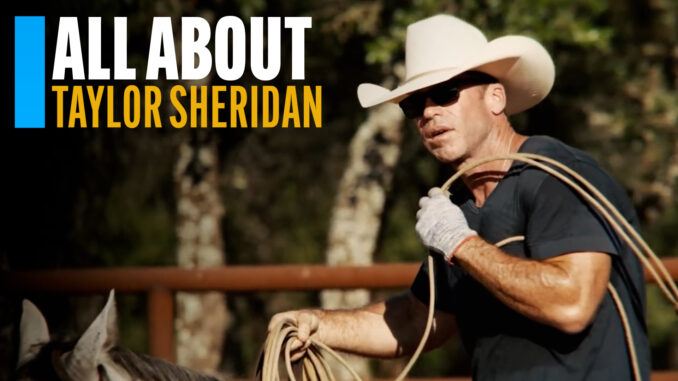
The landscape of American storytelling, much like the vast, untamed territories it often depicts, is constantly shifting. Yet, amidst the seismic tremors of corporate mergers and streaming wars, certain figures stand like ancient mesas, enduring and defined by their own singular truths. This dynamic tension—between the relentless currents of change and the immovable anchors of authenticity—is vividly illustrated by the disparate yet connected threads of Billy Bob Thornton’s enduring artistry, Sam Elliott’s sage commentary on Taylor Sheridan’s rumored departure from Paramount, and the uncertain future of a project like “Landman.”
Billy Bob Thornton, with his languid drawl and eyes that seem to hold the collected melancholy of a hundred backroad juke joints, is a living testament to a certain American gothic. He doesn’t conform; he simply is. His characters, whether the gentle, homicidal Karl Childers in Sling Blade or the perpetually sour Willie Soke in Bad Santa, are cut from the same cloth of complicated humanity—flawed, often broken, but undeniably real. Thornton embodies a spirit that resists easy categorization, much like a gnarled oak tree stubbornly rooted in a flood plain. He’s a storyteller less interested in the polished veneer of Hollywood and more in the raw, exposed nerves of the human condition. His artistry speaks to a truth found not in algorithms or market research, but in the quiet corners of the soul, a place unburdened by studio contracts or IP ownership. He’s a reminder that some creative spirits operate on their own terms, their value intrinsic, not dictated by the fleeting whims of the entertainment industrial complex.
The notion of an artist’s autonomy takes on a sharper edge when considering the swirling rumors of Taylor Sheridan’s potential departure from Paramount. Sheridan, the architect of a sprawling cinematic universe built on the dust and grit of the modern West, has become a titan. His Yellowstone saga, 1883, 1923, and the burgeoning Mayor of Kingstown and Tulsa King, represent a gold rush for the studio, transforming a niche genre into a cultural phenomenon. It’s a creative empire, built on Sheridan’s distinctive voice and relentless work ethic.
Enter Sam Elliott. If Billy Bob Thornton is the spirit of Southern gothic grit, Sam Elliott is the very embodiment of the Western myth, his voice a rumbling canyon wind, his mustache a flag of leathery wisdom. One can almost hear his slow, measured words, delivered with a thoughtful pause, if asked about Sheridan and Paramount:
“Well, now,” he’d likely begin, the timbre of his voice like old whiskey and saddle leather. “Taylor, he’s a man who understands the land, understands the struggle. He’s told some damn good stories. But that’s the thing about stories, and about land, too: nobody truly owns it. You can draw lines on a map, put a brand on a steer, sign a contract with a big studio… but the spirit of it, the truth of it, that keeps moving. Paramount, they got a good thing goin’ with Taylor, sure. But these big corporations, they’re like weather systems. They blow in, they blow out. A man like Taylor, he’s got a vision. And sometimes, a vision needs room to breathe, away from the concrete walls of a boardroom. You can’t fence in the wind, and you can’t truly own a good story, not when it comes from the heart.”
Elliott’s imagined words cut to the core of the issue: the inherent conflict between artistic vision and corporate control. Sheridan’s success is predicated on his singular voice, a voice that might, at some point, chafe under the demands or restrictions of even a supportive studio. The hypothetical split isn’t just about contracts; it’s about the very soul of the narratives being told.
This brings us to the future of “Landman,” a series Sheridan is developing, reportedly based on the Boomtown podcast, delving into the cutthroat world of West Texas oil. “Landman” is a title pregnant with meaning. It speaks of those who navigate the treacherous terrain of property rights, mineral leases, and human ambition, all against the backdrop of an unforgiving landscape where fortunes are made and lost with the drill bit. If Sheridan were to leave Paramount, “Landman” becomes a tangible symbol of that shift. Would it follow him to a new creative home, or would it remain at Paramount, potentially stripped of its originating vision, perhaps helmed by others attempting to mimic Sheridan’s signature style?
The fate of “Landman” isn’t merely about another television show; it’s about the continued telling of stories that ground us in the complex realities of America. It represents the potential next frontier of Sheridan’s exploration of power, land, and identity—a continuation of the themes that resonate so deeply with audiences. Its future, tied to the dance between creator and corporation, illustrates the precarious balance that defines contemporary storytelling.
In the end, Billy Bob Thornton, with his unwavering commitment to portraying human struggle, stands as a bedrock of artistic integrity. Sam Elliott’s imagined commentary serves as a wise reminder that true creative spirit transcends corporate boundaries. And “Landman,” in its uncertain future, becomes a microcosm of the larger struggle for ownership—not just of intellectual property, but of the very narratives that shape our understanding of ourselves and our place on this vast, complicated land. The land, as Elliott might say, always finds a way to tell its story, regardless of who holds the deed.
